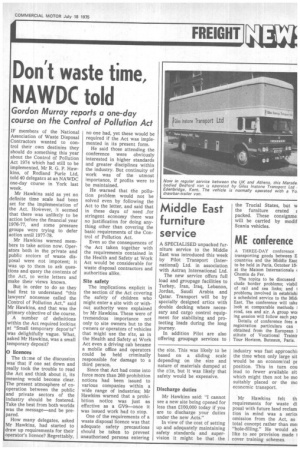Don't waste time, NAWDC told
Page 19

If you've noticed an error in this article please click here to report it so we can fix it.
Gordon Murray reports a one-day course on the Control of Pollution Act
IF members of the National Association of Waste Disposal Contractors wanted to control their own destinies they should do something this year about the Control of Pollution Act 1974 which had still to be implemented, Mr R. G. P. Hawkins, of Redland Pude Ltd, told 40 delegates at an NAWDC one-day course in York last week.
Mr Hawkins said as yet no definite time scale had been set for the implementation of the Act. However, :t seemed that there was unlikely to be action before the financial year 1976-77, and some pressure groups were trying to defer action until 1977-78.
Mr Hawkins warned members to take action now. Operators both in the private •and public sectors of waste disposal were not impotent; it was up to them to ask questions and query the contents of the Act, to write letters and make their views known.
But in order to do so they had first to understand "this lawyers' nonsense called the Control of Pollution Act," said Mr Hawkins, and that was the primary objective of the course.
A number of definitions within the Act required looking at "Small temporary depos'ts" was delightfully vague. What, asked Mr Hawkins, was a small temporary deposit?
0 licences The the:me of the discussion was that if one sat down and really took the trouble to read the Act and think about it, its meaning would become clear. The present atmosphere of cooperation between the public and private sectors of the industry should be fostered. Take the best from both worlds was the message—and be prepared.
How many delegates, asked Mr Hawkins, had started to draw up requirements for their operator's licence? Regrettably, no one had, yet these would be required if the Act was implemented in its present form.
He said those attending the conference were obviously interested in higher standards and greater disciplines within the industry. But continuity of work was of the utmost importance, if profits were to be maintained.
He warned that the pollution problem would not be solved even by following the Act to the letter, and said that in these days of need for stringent economy there was no justification for doing anything other than covering the basic requirements of the Control of Pollution Act.
Even so the consequences of the Act taken together with the requirements contained in the Health and Safety at Work Act would be considerable for waste disposal contractors and authorities alike.
Site safety
The implications explicit in the section of the Act covering the safety of children who might enter a site with or without authority were explained by Mr Hawkins. These were of tremendous importance not only to site owners but to the owners or operators of vehicles that might use the site, as in the Health and Safety at Work Act even a driving cab became a mobile office and operators could be held criminally responsible for damage to a third person.
Since that Act had come into force more than 260 prohibition notices had been issued to various companies within a wide range of industries; Mr Hawkins warned that a prohibition notice was just as effective as a GV9—once it was issued work had to stop.
One of the requirements of a waste disposal licence was that adequate safety precautions should be taken to prevent unauthorised persons entering the site. This was likely to be based on a sliding scale depending on the size and nature of materials dumped at the E.,:te, but it was likely that safety would be expensive.
Discharge duties
Mr Hawkins said: "I cannot see a new site being opened for less than £100,000 today if you are to discharge your duties under the new Acts."
In view of the cost of setting up and adequately maintaining safety standards and supervision it might be that the industry was fast approachii the time when only large sit would be an economtal pr position. This in turn ccu lead to fewer available sit which might then not be ma suitably placed or the mo economic transport.
Mr Hawkins felt th requirements for waste di posal with future land reclam tion in mind was a serial omission from the Act, as total concept rather than me "hole-filling." He would all like to see provision made cover training schemes.




























































































